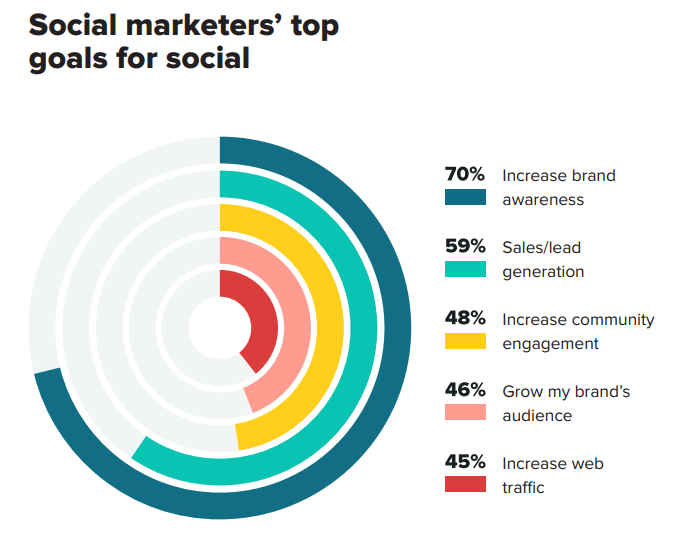Creating a robust social media marketing strategy is akin to having a blueprint for success in your social media efforts. Just as a meal lacks flavor without salt, your social media platforms may feel incomplete and less effective without a well-defined strategy. It’s like embarking on a journey without a map; you might eventually reach your destination, but it will be a lot more challenging and less efficient.
To truly harness the power of social media and achieve meaningful results, it’s crucial to develop a strategy that outlines your goals, identifies your target audience, and addresses their specific needs and interests. Here’s a more detailed breakdown of the five-step approach to creating an effective social media marketing strategy:
- Why: This is where you define the purpose behind your social media presence. Why are you using social media? What do you aim to achieve? Your “why” should align with your overall business objectives. Social media goals can include:
- Increasing Brand Awareness: If your primary goal is to make more people aware of your brand, your social media strategy will focus on activities that raise your brand’s visibility.
- Driving Website Traffic: For businesses looking to direct traffic to their websites, the strategy will involve sharing content and links that encourage users to visit your site.
- Generating Leads: Social media can be a valuable lead-generation tool. In this case, your strategy will involve creating content and offers that capture user information.
- Growing Revenue: Businesses can use social media to boost sales by increasing sign-ups, making more sales, or promoting special offers.
- Boosting Brand Engagement: If engagement and interaction are your priorities, your strategy will emphasize creating content that encourages likes, comments, and shares.
- Building a Community: For some brands, fostering a community around their products or services is essential. Social media can facilitate this through groups, forums, or dedicated online spaces.
- Providing Customer Service: Social media can be a platform for addressing customer queries and providing support.
- Increasing Mentions in the Press: PR-focused strategies aim to generate media attention and mention through social channels.
- Listening to Conversations: Social listening involves monitoring and engaging in relevant conversations about your brand or industry.

Your specific goals will influence your overall approach to social media.
- Who: Understanding your target audience is paramount. You need to create detailed buyer personas that represent your ideal customers. These personas should encompass various demographic and psychographic factors:
- Demographics: Age, gender, income, location, occupation, etc.
- Psychographics: Interests, values, lifestyles, attitudes, behaviors, motivations, pain points, and goals.
- Online Behavior: Preferred social media platforms, the timing of their online activity, content consumption habits, and preferred content types.
The better you understand your audience, the more effectively you can tailor your content and messaging to resonate with them.
- What: Your content strategy is central to your social media marketing strategy. Consider the types of content that will best serve your audience and goals. Instead of thinking about content in terms of formats like videos, images, or articles, focus on themes or topics.
Your chosen themes should align with your audience’s interests and address their specific goals or challenges. For instance, a fitness apparel brand might focus on themes related to fitness tips, workout routines, and healthy living if its target audience is health-conscious individuals.
- Where: Not all social media platforms are created equal, and not every platform is suitable for your brand. You need to decide where your brand should establish its presence. While it’s not necessary to be on every platform, it’s advisable to have a comprehensive profile on major platforms like Facebook, Instagram, Twitter, and LinkedIn. These platforms often show up prominently in Google search results when people search for your brand.

However, understanding your target audience is crucial when deciding where to allocate your resources. Determine which platforms your audience frequents the most. For example, if your audience primarily consists of teenagers, platforms like TikTok or Snapchat might be more relevant.
Also, consider the content format that aligns with each platform. Instagram is ideal for sharing visually appealing images and stories, while YouTube is a platform for long-form video content.
- When: Timing is critical in social media marketing. To determine when to share your content, you should consider the typical behavior patterns of your target audience. When are they most active on social media? When are they likely to be seeking the type of content you’re offering?
For example, if your target audience comprises sports fans, you might find that they’re most active on social media just before, during, and after sporting events. Understanding these behavior patterns can help you schedule your content to reach your audience when they’re most receptive.
Remember, there’s no universal “best” time to post on social media. It varies depending on your audience and their habits.
Finally, after you’ve created your social media marketing strategy, you need to develop a detailed plan for execution. Your plan should encompass elements like optimizing your social media profiles, defining your brand’s tone and voice, selecting the appropriate types of posts (e.g., images, links, videos), and establishing a content calendar. This plan will serve as your roadmap to achieving your social media and business goals.
In essence, a social media marketing strategy is your guiding light. It helps you navigate the complex and ever-evolving landscape of social media by providing clarity, purpose, and direction. With a well-structured strategy and a thought-out plan, you’re better equipped to make informed decisions, create meaningful content, and ultimately succeed in achieving your objectives on social media.




